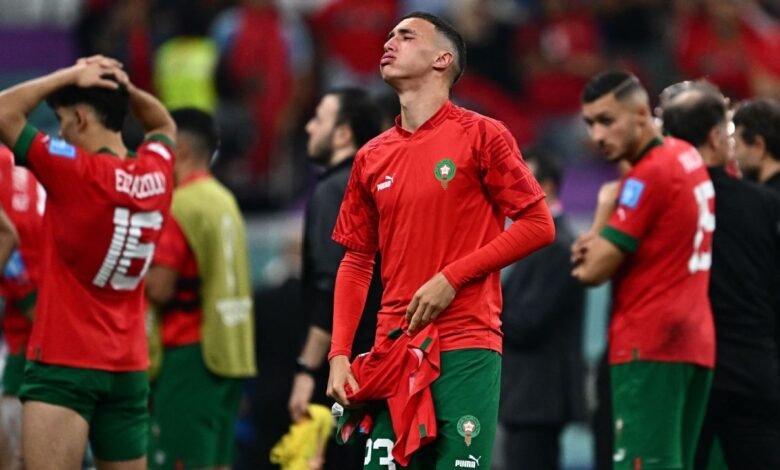Morocco’s World Cup inspirational run put powers on notice

[ad_1]
AL KHOR, Qatar — At the ultimate whistle, Morocco coach Walid Regragui embraced his reverse quantity, France boss Didier Deschamps, who had simply guided Les Bleus to a second consecutive World Cup closing. Regragui gathered his group of bruised and spent gamers after Wednesday’s 2-0 defeat right into a huddle in the course of the pitch and, after a short speech, guided them in direction of the stand behind one of many targets, turned blood-red by the jerseys and flags of the overwhelmingly Morocco-supporting — however not essentially Moroccan — crowd.
Almost as one, they bowed on the pitch in prayer, after which thanked their supporters. It felt solemn. It felt real. And the group roared mightily in approval. Not even the stadium DJ’s ill-advised alternative of blasting Gala’s “Freed from Desire” and segueing into an terrible model of Gloria Gaynor’s “I Will Survive” may spoil the second.
– World Cup 2022: News and options | Bracket | Schedule
You might imagine their run on the World Cup had ended. Technically, you would be proper — though they play the third-place comfort match in opposition to Croatia on Saturday. Emotionally, you would be improper. Because the sensation does not finish right here. It felt extra like a starting. And it isn’t nearly Morocco, it is concerning the beginnings of a world order being upended. Or possibly simply the hope, the vibe, that the perennial blue bloods who’ve hegemonized the game for practically a century could go away room for someone else.
This was greater than an underdog story, extra than simply neutrals rooting in opposition to the favorites, be they France, Portugal or Spain. This was the remainder of the world uniting behind them. Morocco grew to become the primary African staff, the primary Arab staff and the second staff from a predominantly Muslim nation (after Turkey in 2002) to achieve the semifinal of a World Cup.
The sport invented in Britain some 160 years in the past and exported to each nook of the world since has been dominated, at the very least on the most important stage of all, by a handful of countries. Only eight nations, from two continents, have gained the World Cup and that will not change this time round, with France and Argentina in Sunday’s closing. But that hegemony is being chipped away.
In all, of the 88 squads which have reached the semifinals within the 22 editions of the World Cup which were held, simply three of them have been from exterior of Europe or South America. One was the United States (sure, actually), means again in 1930 on the inaugural World Cup in Uruguay. Another was South Korea in 2002, the place they served as co-hosts with Japan.
And now there’s Morocco. Over the course of the match they ignited the eagerness of a area — a number of areas, the truth is, a operate of their Arab-African-Muslim id — and so they did it in essentially the most simple and trustworthy means potential: by enjoying good soccer, usually in overmatched circumstances, usually burdened by accidents, all the time with ardour.
Regragui knew what buttons to push. He named center-back Nayef Aguerd within the beginning lineup submitted to FIFA, understanding there was no means he may take the pitch, solely to alter him simply earlier than kickoff. Aguerd, Morocco’s excellent defender within the group stage, had come off injured within the victory over Spain, but it surely felt like a symbolic gesture. Aguerd’s defensive accomplice, Romain Saiss, was additionally injured however he gritted his enamel, began and performed for 20 minutes in what felt like soccer’s reply to Willis Reed’s legendary look for the New York Knicks in Game 7 of the 1970 NBA Finals.
Regragui’s mastery at squeezing essentially the most out of his group of gamers was key to their run. He did it with symbols (as talked about above), psychology (inviting not simply the gamers’ wives and girlfriends, however their moms and dads as nicely into the camp) and a heck of loads of tactical nous.
Morocco’s medium-block defensive depth and counterattacking prowess — breaking not simply with uncooked pace, however with passing and precision — allowed them to compete with extra gifted sides. Their defensive fortitude and a few phenomenal particular person performances — goalkeeper Yassine Bounou, Saiss, fullback Achraf Hakimi and midfield duo Sofyan Amrabat and Azzedine Ounahi are all team-of-the-tournament contenders — pushed them over the road.
Much has been fabricated from the Moroccan diaspora and the way 14 of Regragui’s 26-man squad have been born exterior the nation and obtained their footballing training overseas: 4 every in Belgium and the Netherlands, two every in Spain and France, one in Canada and one in Italy. That’s a part of the story and a part of the fact of soccer and modern-day patterns of migration. But it isn’t as if Morocco merely cherry-picked a bunch of twin nationality gamers. The bond with their ancestry and tradition is robust. And their ascent to the nationwide facet was not an accident.
In 2009, the Moroccan FA opened the Mohammed VI Football Academy, their very own model of Clairefontaine in France or St George’s Park in England, i.e., a state-of-the-art nationwide coaching middle to develop the following era of footballers domestically and, additionally, a means of showcasing services which have been under no circumstances inferior to these in wealthier footballing nations. The impact was twofold. It enticed gifted gamers of Moroccan descent to decide on the nation of their dad and mom and grandparents. And it spurred additional funding into the sport domestically.
Morocco gained the latest African Nations Championship — a continental competitors reserved for footballers enjoying in Africa, differing from the extra distinguished Africa Cup of Nations match by which nearly all of the gamers ply their commerce overseas. In addition, Moroccan golf equipment are the reigning champions in Africa’s CAF Champions League (Al Wydad) and the second-tier CAF Confederation Cup (RS Berkane). In different phrases, this success will not be constructed on sand. Seeds have been planted. Pathways have been drawn. Europe and South America could have the historic legacy and the know-how, however the hole is narrowing.
“You can’t win a World Cup with miracles,” Regragui stated after Wednesday’s match. “You need to do it through hard work and that’s what we are going to do. We are going to keep working.”
Maybe it is nonetheless a chasm. Maybe the World Cup will stay a winners’ circle of simply eight members for the following few many years. Maybe, like Pele’s oft-mocked prediction that an African staff would win the World Cup by 2000, it is simply wishful pondering, someplace between a fantasy and a flight of folly.
But that dream grew to become actuality for the previous few weeks. The very thought of chance grew to become tangible. And that means that the wheels are in movement. They are constructing it. And it’ll come.
[ad_2]
Source link





